

Leo Tolstoy, Mallette Dean, Illustrator. Belvedere, California: The L-D Allen Press, 1951.
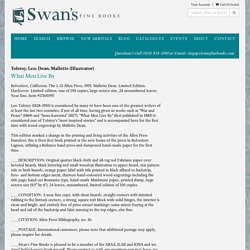
Mallette Dean. Limited Edition. Hardcover. Limited edition, one of 150 copies, large octavo size, 24 unnumbered leaves. Near fine. Leo Tolstoy (1828-1910) is considered by many to have been one of the greatest writers of at least the last two centuries, if not of all time, having given us works such as "War and Peace" (1869) and "Anna Karenina" (1877). This edition marked a change in the printing and living activities of the Allen Press founders; this is their first book printed at the new home of the press in Belvedere Lagoon, utilizing a Reliance hand press and dampened hand-made paper for the first time. ___CITATION: Allen Press Bibliography, no. 10. Poet and Prophet: Dosteovsky of our Time - Juergen Spiess. The Trouble with Tolstoy #1. "Tolstoy's Confessions" by Clifford Goldstein.
DOSTOEVSKY RESEARCH STATION: Table of Contents. Irwin Weil on Dostoevsky. "Dostoyevsky's Question" by Clifford Goldstein. Dostoevsky and Nietzsche. Ivan Karamazov and The Devil. Afterword to The Brothers Karamozov. A portrait of Dostoevsky hangs in my living room, drawn from photographs by my stepson Philip: Dostoevsky is his favorite writer, The Brothers Karamazov his favorite novel.
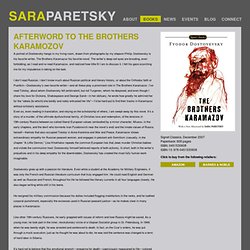
The writer’s deep-set eyes are brooding, even forbidding; as I read and re-read Karamazov, and realized how little fit I am to discuss it, I felt his gaze scorching me for my impudence in taking on the task. I don’t read Russian. I don’t know much about Russian political and literary history, or about the Orthodox faith or Pushkin—Dostoevsky’s own favorite writer—and all these play a prominent role in The Brothers Karamazov. I’ve read Tolstoy, about whom Dostoevsky felt ambivalent, but not Turgenev, whom he despised, and even though I share his love for Dickens, Shakespeare and George Sand—in her obituary, he wrote how greatly he admired her for the “ideals [to which] she boldly and nobly entrusted her life”—I’d be hard-put to find their tracks in Karamazov without scholarly assistance.
The Gooseberry Fallacy. Email This Post Print This Post Tolstoy’s 1886 parable, How Much Land Does a Man Need has been on my mind recently.

The Grand Inquisitor - John Gielgud. Leo Tolstoy on Emotional Infectiousness and What Separates Good Art from Bad. By Maria Popova “A real work of art destroys, in the consciousness of the receiver, the separation between himself and the artist.”
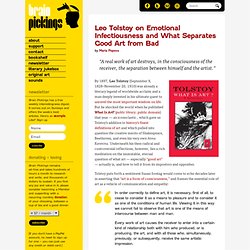
By 1897, Leo Tolstoy (September 9, 1828–November 20, 1910) was already a literary legend of worldwide acclaim and a man deeply invested in his ultimate quest to unravel the most important wisdom on life. But he shocked the world when he published What Is Art? (public library; public domain) that year — an iconoclastic , which gave us Tolstoy’s addition to history’s finest definitions of art and which pulled into question the creative merits of Shakespeare, Beethoven, and even his very own Anna Karenina. LEO TOLSTOY on Film (1908) - 80th Birthday plus more rare footage.
Don Sheehan. DOSTOEVSKY AND MEMORY ETERNAL An Eastern Orthodox Approach to the Brothers Karamazov by Donald Sheehan.
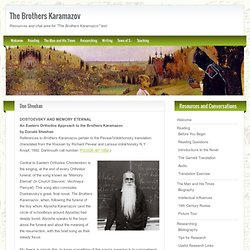
Why We Hurt Each Other: Tolstoy’s Letters to Gandhi on Love, Violence, and the Truth of the Human Spirit. By Maria Popova “Love is the only way to rescue humanity from all ills.”
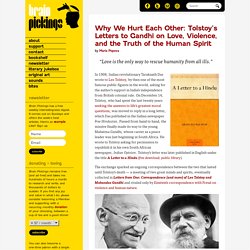
In 1908, Indian revolutionary Taraknath Das wrote to Leo Tolstoy, by then one of the most famous public figures in the world, asking for the author’s support in India’s independence from British colonial rule. On December 14, Tolstoy, who had spent the last twenty years seeking the answers to life’s greatest moral questions, was moved to reply in a long letter, which Das published in the Indian newspaper Free Hindustan.
Passed from hand to hand, the missive finally made its way to the young Mahatma Gandhi, whose career as a peace leader was just beginning in South Africa. He wrote to Tolstoy asking for permission to republish it in his own South African newspaper, Indian Opinion. George Orwell: Lear, Tolstoy and the Fool. Tolstoy's pamphlets are the least-known part of his work, and his attack on Shakespeare(1) is not even an easy document to get hold of, at any rate in an English translation.
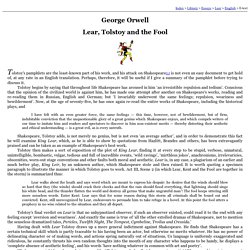
Perhaps, therefore, it will be useful if I give a summary of the pamphlet before trying to discuss it. Tolstoy begins by saying that throughout life Shakespeare has aroused in him ‘an irresistible repulsion and tedium’. Kholstomer - The Story of a Horse, by Leo Tolstoy. Higher and higher receded the sky, wider and wider spread the streak of dawn, whiter grew the pallid silver of the dew, more lifeless the sickle of the moon, and more vocal the forest.
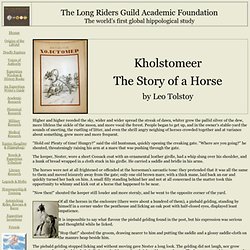
People began to get up, and in the owner's stable-yard the sounds of snorting, the rustling of litter, and even the shrill angry neighing of horses crowded together and at variance about something, grew more and more frequent. "Hold on! Plenty of time! Hungry? " said the old huntsman, quickly opening the creaking gate. The keeper, Nester, wore a short Cossack coat with an ornamental leather girdle, had a whip slung over his shoulder, and a hunk of bread wrapped in a cloth stuck in his girdle. The horses were not at all frightened or offended at the horseman's sarcastic tone: they pretended that it was all the same to them and moved leisurely away from the gate; only one old brown mare, with a thick mane, laid back an ear and quickly turned her back on him. "Now then! " "What are you sighing for?
" Tolstoy the Spiritual Anarchist: On "A Confession" Leo Tolstoy's Theory of History. TOLSTOY - The Three Questions by Leo Tolstoy - Short story audiobook - FAB. Thecrocodile. The Crocodile An Extraordinary Incident A true story of how a gentleman of a certain age and of respectable appearance was swallowed alive by the crocodile in the Arcade, and of the consequences that followed. Ohe Lambert! Ou est Lambert? As-tu vu Lambert?